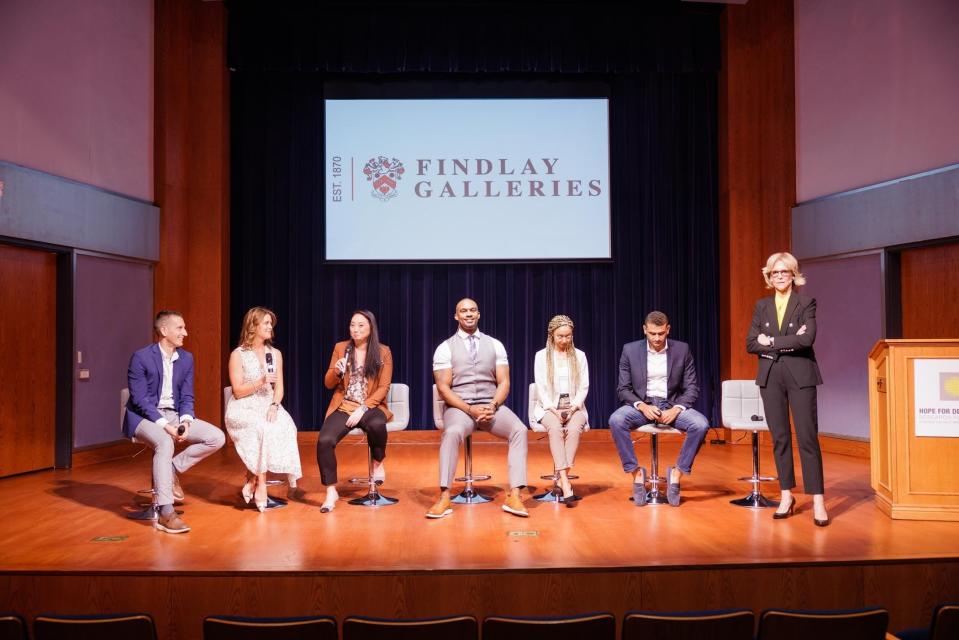Hope for Depression forum targets youth mental health
The statistics surrounding teen depression may be grim, but there is hope.
That was the message Thursday night at the panel discussion “Teenagers and Depression: Addressing the Youth Mental Health Crisis in America” organized by the Hope for Depression Research Foundation.
More: Resort Report: In Southampton, a sunny luncheon shines light on a serious subject

Founded by Palm Beach philanthropist Audrey Gruss in memory of her mother, Hope, who struggled with depression throughout her life, the foundation is the leading depression research organization in the United States. While the event was postponed from the previous week because of Hurricane Ian, registration was full and about 150 people, including dozens of students, attended the symposium at Palm Beach Atlantic University in West Palm Beach.
The evening’s discussion was all the more timely following the news earlier in the day that a 17-year-old high school student jumped to their death from a balcony at Fort Lauderdale High School.
“It seems like something happens every day,” said Louisa Benton, executive director of the Hope for Depression Research Foundation. “It really makes me inspired and encouraged to see you all here today. … The pandemic has really brought this issue to the fore.”
Benton moderated the panel, which included neuroscientist Christoph Anacker, of Columbia University and the Hope for Depression Research Foundation Task Force; licensed mental health counselor Erinn F. Beck with Restoring Hope of the Palm Beaches; psychiatrist Dr. Wei-li Chang of Columbia University and the Hope for Depression Research Foundation Task Force; Anthony Trucks, former National Football League player and founder of Identity Shift Coaching; and PBA students Imad Mawass and Julissa Gonzalez of the school’s Active Minds chapter, an organization that supports mental health awareness and education for young people.
The discussion was filled with useful advice for those monitoring young people for the signs of depression, while also offering practical tips to support those who may be experiencing depression and anxiety.
While the statistics weren’t the only story Thursday night, they helped to frame the discussion: More than a third of high school students experience sadness or hopelessness, up 40% since 2009. Each day, almost 4,000 children and teens attempt suicide. For teens ages 15-19, suicide is the second leading cause of death.
“This is a type of suffering that affects the whole person,” Beck said, adding that there are many physical signs of depression, including headaches, stomachaches and fatigue.
It consists of two weeks or more of feeling down or low most of the time, Chang said. Younger people also show their depression differently, sometimes as irritability, she said. “It’s not just feeling sad,” Chang said.
Panelists also discussed teens’ reluctance to seek help, and how parents and other adults in a teen’s life can create a safe space to share.
Mawass and Gonzalez both shared their experiences with depression. Some teens are reluctant to speak up because they are ashamed or concerned their parents will be upset, Mawass said.
“It’s a life-changing moment,” Gonzalez said of sharing her feelings of depression with her parents. “When you put yourself out there, it’s going to be a little nerve-wracking.”
Some teens may not have someone or know to whom they can talk about their depression, Trucks said. Growing up, his mom was distant and gave him away as a child. His father was absent. Going to his parents was not an option, Trucks said.
Now, he is “overly present” for his three children, Trucks said.
Anacker discussed how modern stressors play a role in the increase in depression and anxiety among teens. Stress responses are designed to help people survive the stressors of thousands of years ago but the stresses of today are more chronic, and the evolution of the human body has not kept pace with how stress has evolved, Anacker said.
It’s important to make time to step away from stress, he said, adding that a healthy sleep routine can play a big role in that. Panelists also suggested physical exercise, breathing exercises and journaling as outlets for stress relief.
Social media was identified as one element that could play a role in the increase in teen depression. “There is a correlation between the advent of social media and declining teenage mental health, but it’s not a causation,” Benton said.
Social media can amplify the already large amount of social stress experienced by teens, Chang said.
“When you’re on social media, it’s really easy to fall into comparison,” Gonzalez said.
PBA senior business management major Ashlie Virgo attended to support her friend, Gonzalez, but decided to participate in the question-and-answer segment of the discussion by asking about how she could best support her younger sister as she enters high school.
“It was so educational,” Virgo said of the panel. “I learned a lot about the signs and what to look for going forward. And I recognized some of the signs in myself in the past, that I didn’t realize were depression.”
Benton said she was “inspired and energized” by the audience and the questions asked by the young people. “Everybody was so interested in the topic and so engaged in a heartfelt way,” she said.
The younger generation has embraced mental health like no generation before, Benton said. “We saw that here with these teens tonight,” she said. “They really have a great knowledge of the issues.”
*
IF YOU NEED HELP
If you or someone you know is depressed or in a mental health crisis, you can dial 988 for the Suicide & Crisis Lifeline, or text “HELLO” to 741741 for the Crisis Text Line.
If you feel you or someone you know is in immediate danger, dial 911.
This article originally appeared on Palm Beach Daily News: Youth mental health focus of Hope for Depression forum

